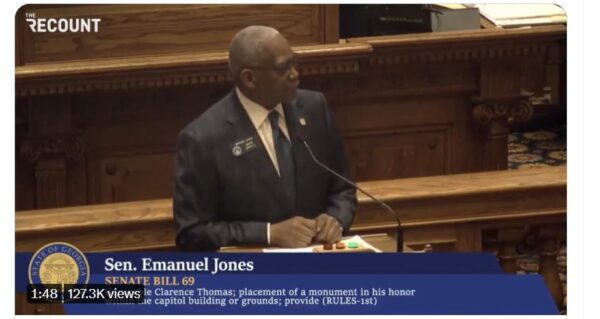Republican lawmakers in Georgia are continuing their campaign to erect a statue of one of the state’s native sons, U.S. Supreme Court Justice Clarence Thomas. However, not all of the elected officials were in favor — blasting the proposed monument characterizing him as having anti-Black leanings, and calling him an “Uncle Tom.”

On Tuesday, Feb. 14, Georgia State Sen. Emanuel Jones was one who took the mic in the state Capitol chambers and shared his thoughts on this statute, Senate Bill 69. He noted just the conversation of sculpting the statue is an issue of race that the body “cannot avoid,” contending that although a sensitive subject, it must be broached with his colleagues.
“In the African-American community, when we talk about a person of color ([a term] that goes back historically to the days of slavery) and that person [seems to be] betraying his own community … We have a term in the Black community called ‘Uncle Tom,’” he explained.
Jones continued, “Uncle Tom is either a fictional or nonfictional character. I don’t really know the origin of Uncle Tom, but it talks about a person who back during the days of slavery sold his soul to the slave masters.”
The senator went on to explain why he and others think Thomas is an “Uncle Tom.”
“When we think about a person in the Black community, who’s accomplished, but yet policies seek to subvert (some may even say suppress) the achievements or the accomplishments of people of color,” he states. “I couldn’t help but to think about that term in expressing my dissatisfaction with this particular legislation.”
Upon hearing the remarks, U.S. Sen. Tim Scott of South Carolina, a Black Republican, took to Twitter and pointed out how contradictory Jones’ statement was, and said it had no place in the forum.
He tweeted, “In the same breath that he says he doesn’t know the origin of ‘Uncle Tom,’ he uses it to describe Clarence Thomas for having the audacity to have his own beliefs. This language has no place in America, and certainly has no place on a Senate floor.”
The irony of Jones’ statement is not just, as Scott highlighted, his lack of awareness about the “origin of Uncle Tom,” but that the nature of the character is not of the back-biting master-loving race-betrayer many have associated with the nickname.
The term comes from Harriet Beecher Stowe’s book “Uncle Tom’s Cabin,” a strong abolitionist literary proclamation of the 19th century. In the book, the protagonist is based on Beecher Stowe’s research and the many slave narratives she encountered about the horrors of chattel bondage, the NPR reports.
Many of the narratives were about passengers on the escape network called the Underground Railroad. One brave soul was Josiah Henson, and scholars have said she pulled a great deal from his story to create the character.
Many have placed a pejorative mockery on Uncle Tom, but the character was intended as a noble man who tried to use his Christian values to endure the harsh inequities of slavery. His hope, after he was sold from a Kentucky plantation to one in Louisiana, was that one day he would be freed.
However, in the book, before those dreams could be realized, he was “whipped to death after refusing to reveal the location of two runaway slaves.”
An Uncle Tom is actually the complete opposite of a sell-out, but a martyr for Black freedom.
Prof. Patricia Turner, who teaches African American Studies at the University of California, said knowing the real meaning of Uncle Tom makes her cringe when she hears people misuse it — especially with Clarence Thomas.
“It was a really rough time for me during the Clarence Thomas hearings because it was very common in the Black community to refer to Clarence Thomas as an ‘Uncle Tom,’” she shared in an interview about the topic. “And my understanding of Justice Thomas, you know, he wasn’t good enough to be the real Uncle Tom. I couldn’t imagine him being someone who would have let himself be beat to death rather than reveal where these two Black women were.”
The statue is still in play, despite pushback by Democrats. According to The Associated Press, the bill was passed in 2022 by Republicans in the state Senate but has yet to clear the House. The repackaged bill proposes the statute would be paid for with private dollars and not from the treasury, as many are.
On Tuesday, the Georgia state Senate voted 32-20 in favor, making it a mandate for the statute. Dems originally proposed to amend the measure, hoping to add a statue for deceased congressman John Lewis but abandoned the idea when the effort seemed futile.


